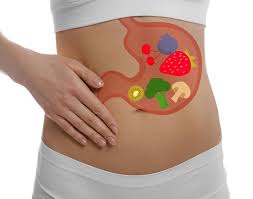Advertisements
The health of our digestive system is often overlooked, but it plays a crucial role in our overall well-being. A diet rich in fiber is essential for maintaining efficient digestion and a healthy gut. Fiber, found mainly in fruits, vegetables, whole grains and legumes, is our body’s true ally, promoting not only proper digestion but also contributing to cardiovascular health and weight control.
In this article, we will explore in depth how dietary fiber works in our bodies, revealing its main benefits and how it helps prevent common digestive discomforts, such as constipation and bloating. We will discuss the different types of fiber, soluble and insoluble, and how each of them performs specific functions in the gastrointestinal tract, promoting a balanced intestinal flora.
Advertisements
We will also discuss the relationship between regular fiber consumption and the prevention of chronic diseases such as type 2 diabetes and heart disease. Understanding how fiber contributes to regulating blood sugar and cholesterol levels can be an important step towards adopting healthier, longer-lasting eating habits.
Finally, we’ll give you practical and accessible tips for including more fiber in your daily diet. With small changes to your eating habits, you can make a big difference to your digestive and overall health. Introducing fiber-rich foods can be simple and tasty, bringing immediate and long-term benefits.
Advertisements
Explore this essential guide and discover how fiber can transform not only your digestive health, but also your overall well-being. The key to a happy gut is closer than you think, and the change can start with your next meal. 🌿

What are fibers and why are they so important?
Dietary fiber is an essential component for the proper functioning of our bodies. It is a type of carbohydrate that the body cannot fully digest. Unlike other nutrients that are broken down and absorbed, fiber passes through the digestive system relatively intact, playing a vital role in intestinal health.
There are two main types of fiber: soluble and insoluble. Soluble fiber, found in foods like oats, apples, and carrots, dissolves in water and forms a gel-like substance, helping to lower cholesterol levels and stabilize blood sugar levels. Insoluble fiber, found in foods like nuts, beans, and green leafy vegetables, helps to add bulk to the stool, making it easier for waste to pass through the intestinal tract and preventing constipation. 🍏🥕
Adequate fiber intake is associated with a number of health benefits. In addition to promoting healthy digestion and keeping your gut happy, fiber also helps control weight by reducing hunger pangs and may even help prevent chronic diseases such as type 2 diabetes and heart disease. Therefore, it is essential to include a variety of fiber-rich foods in your daily diet to ensure that your body functions properly and that you have a better quality of life.
How Fiber Affects Gut Health
One of the main functions of fiber in the body is to promote intestinal health. It plays a crucial role in regulating intestinal transit, helping to prevent both constipation and diarrhea. This is because insoluble fiber adds bulk to stool, while soluble fiber can help absorb excess water, normalizing intestinal transit.
Additionally, dietary fiber is essential for the health of the intestinal microbiota. When soluble fiber reaches the colon, it is fermented by beneficial bacteria, producing short-chain fatty acids that serve as fuel for the colon cells. This not only strengthens the intestinal barrier, but also improves the immune response and reduces inflammation, which are important factors in the prevention of intestinal and systemic diseases.
Adequate fiber balance in your diet can also reduce your risk of developing bowel diseases such as irritable bowel syndrome (IBS) and diverticulitis. Therefore, ensuring you get fiber from a variety of food sources is essential to keeping your bowels functioning efficiently and healthily.
Tips for increasing fiber intake in your diet
Increasing your fiber intake is simpler than it seems and can have significant health benefits. Here are some practical tips to help you include more fiber in your daily meals:
- Start your day with whole grains: Opting for oatmeal or whole grain cereal for breakfast can give you a nice fiber boost first thing in the morning.
- Add fruits and vegetables to every meal: Fruits such as apples, pears and berries, as well as green leafy vegetables, are rich in fiber and can be easily incorporated into salads, snacks and main dishes.
- Choose whole grains: Whenever possible, replace refined breads, pastas and rice with their wholegrain versions, which contain more fiber.
- Include legumes in your diet: Beans, lentils and chickpeas are rich sources of fiber and can be used in soups, salads or as side dishes.
- Healthy snack: Choose nuts and seeds as snacks between meals, as they are great sources of fiber and healthy fats.
Making these dietary changes can not only increase your fiber intake, but also provide a variety of essential nutrients, contributing to a more balanced and healthy diet. 🥗🥥
Additional Benefits of Fiber for Overall Health
In addition to promoting healthy digestion, fiber offers a number of other important benefits for overall health. One of the main ones is fiber’s role in maintaining healthy cholesterol levels. Soluble fiber, in particular, can help reduce levels of LDL cholesterol (the “bad” cholesterol) by binding to it in the intestine and making it easier to excrete from the body. This can lower the risk of cardiovascular disease.
Another significant benefit of fiber is its effect on blood glucose levels. Soluble fiber can slow the absorption of sugar, helping to stabilize glucose and insulin levels after meals. This is especially beneficial for people with type 2 diabetes or those seeking to prevent this condition.
Additionally, adequate fiber intake has been linked to weight control. Fiber increases feelings of fullness, which can help reduce overall calorie intake throughout the day. This is helpful for both weight loss and long-term maintenance of a healthy weight.
Incorporating fiber into your diet not only improves digestive health, but also contributes to a healthy heart, balanced blood glucose levels, and effective weight management. Fiber is therefore an essential part of a healthy, balanced diet, offering benefits that extend beyond the digestive system.
Food sources rich in fiber
To ensure you’re getting enough fiber in your diet, it’s important to know the best food sources of this essential nutrient. Let’s explore a few options that can easily be incorporated into your daily meals:
- Fruits: Apples, bananas, oranges, pears and berries are all rich in fiber and can be eaten fresh or in natural juices.
- Vegetables: Carrots, beets, broccoli, and artichokes are great choices for increasing fiber intake in salads, soups, and cooked dishes.
- Whole grains: Brown rice, quinoa, oats and barley are options that provide a good amount of fiber and can be used as a base for several meals.
- Legumes: Beans, lentils, peas, and chickpeas are excellent sources of fiber and can be included in a variety of dishes.
- Nuts and seeds: Almonds, chia, flaxseeds, and pumpkin seeds not only offer fiber, but they also provide healthy fats and important nutrients.
Exploring these food sources and making smart substitutions in your meals can help ensure you're getting enough fiber to support your digestive and overall health. 🍌🥦
Considerations for increasing fiber intake
When deciding to increase your fiber intake, it’s important to do so gradually. A sudden increase in fiber can cause abdominal discomfort, such as bloating and gas. Introducing more fiber slowly over a few weeks allows your digestive system to adjust to the change.
Additionally, adequate water intake is essential when increasing fiber intake. Fiber absorbs water in the intestines, and without sufficient hydration, it can cause constipation. Therefore, drinking plenty of water throughout the day is essential to reap the benefits of fiber without discomfort.
For some people, especially those with specific bowel conditions such as irritable bowel syndrome, certain types of fiber can exacerbate symptoms. In these cases, it is important to consult a healthcare professional for personalized guidance on the amount and type of fiber that is most appropriate.
Incorporating more fiber into your diet is an important step toward better health, but it should be done carefully and with attention to your individual needs. That way, you can enjoy the many benefits of fiber without any unwanted side effects.
Conclusion
The importance of fiber for healthy digestion and a happy gut cannot be overstated. Firstly, fiber is essential for the proper functioning of the digestive system. It helps regulate intestinal transit, preventing problems such as constipation and diarrhea. Additionally, a diet rich in fiber can reduce the risk of developing chronic diseases such as type 2 diabetes and heart disease.
Another crucial point is that fiber promotes a feeling of fullness, which helps with weight control. This is because it takes longer to digest, keeping you fuller for longer. In addition, fiber feeds the beneficial bacteria in the gut, promoting a healthy microbiome, which is essential for the overall health of the body.
To add more fiber to your diet, opt for whole grains, fruits, vegetables, and legumes. A simple but effective change is to replace white bread with whole grain bread and include more salads and fruits in your daily meals.
In short, eating a fiber-rich diet is a smart strategy for maintaining digestive health and promoting overall well-being. So, make conscious choices and include more fiber in your diet for a happy gut and a healthier life. 🌿




